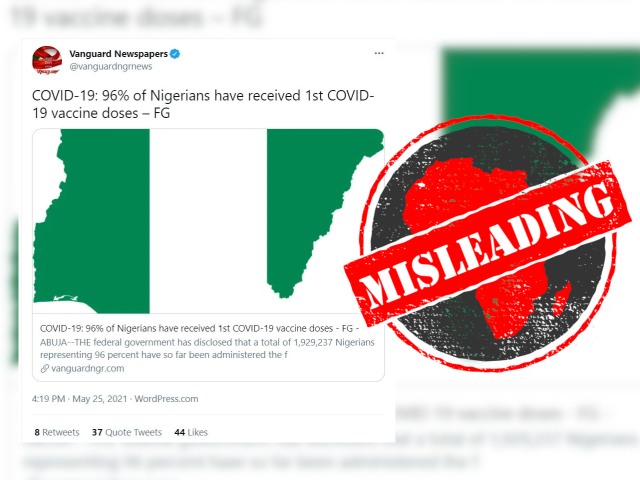South Africa is approaching 50 days of lockdown meant to contain the coronavirus. Its people “need to now brace for water cuts and higher tariffs going forward as the R220 million allocated for drought relief went ‘missing’”.
That’s the claim in a graphic posted on Facebook on 12 May 2020. So far, it’s been viewed more than 25,000 times.
The graphic includes a screenshot of an eNCA TV news report. Text on the screen reads: “R220M DROUGHT RELIEF MISSING.”
But the news is old.

The eNCA news report is from 5 February 2019 – more than a year ago. It covers a press conference in which Nomusa Dube-Ncube, head of cooperative governance and traditional affairs in the KwaZulu-Natal provincial government, discusses an investigation into missing funds.
In 2015, the national government gave the province more than R350 million to help farmers during a severe drought.
TimesLive reported in June 2017 that commercial farmers’ organisation Agri-SA had “approached the Public Protector and the auditor-general to investigate what happened to millions of rand in state drought relief funds allocated for distressed farmers”.
Three months later Themba Mthembu, then the head of the KwaZulu-Natal agriculture department, announced a forensic investigation into how R200 million of the drought relief budget had been spent.
In her February 2019 press conference, Dube-Ncube said the investigation had not been concluded.
But the R220 million did not go missing in May 2020, which the graphic does not make clear, and there have been no official announcements of “water cuts and higher tariffs going forward”. – Mary Alexander
That’s the claim in a graphic posted on Facebook on 12 May 2020. So far, it’s been viewed more than 25,000 times.
The graphic includes a screenshot of an eNCA TV news report. Text on the screen reads: “R220M DROUGHT RELIEF MISSING.”
But the news is old.

Investigation launched in 2017
The eNCA news report is from 5 February 2019 – more than a year ago. It covers a press conference in which Nomusa Dube-Ncube, head of cooperative governance and traditional affairs in the KwaZulu-Natal provincial government, discusses an investigation into missing funds.
In 2015, the national government gave the province more than R350 million to help farmers during a severe drought.
TimesLive reported in June 2017 that commercial farmers’ organisation Agri-SA had “approached the Public Protector and the auditor-general to investigate what happened to millions of rand in state drought relief funds allocated for distressed farmers”.
Three months later Themba Mthembu, then the head of the KwaZulu-Natal agriculture department, announced a forensic investigation into how R200 million of the drought relief budget had been spent.
In her February 2019 press conference, Dube-Ncube said the investigation had not been concluded.
But the R220 million did not go missing in May 2020, which the graphic does not make clear, and there have been no official announcements of “water cuts and higher tariffs going forward”. – Mary Alexander
Republish our content for free
For publishers: what to do if your post is rated false
A fact-checker has rated your Facebook or Instagram post as “false”, “altered”, “partly false” or “missing context”. This could have serious consequences. What do you do?
Click on our guide for the steps you should follow.
Publishers guideAfrica Check teams up with Facebook
Africa Check is a partner in Meta's third-party fact-checking programme to help stop the spread of false information on social media.
The content we rate as “false” will be downgraded on Facebook and Instagram. This means fewer people will see it.
You can also help identify false information on Facebook. This guide explains how.




Add new comment